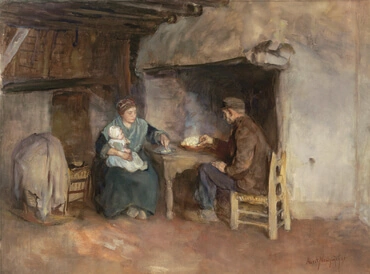1
レビびとである祭司すなわちレビの全部族はイスラエルのうちに、分も嗣業も持たない。彼らは主にささげられる火祭の物と、その他のささげ物とを食べなければならない。
2
彼らはその兄弟のうちに嗣業を持たない。かつて彼らに約束されたとおり主が彼らの嗣業である。
3
祭司が民から受ける分は次のとおりである。すなわち犠牲をささげる者は、牛でも、羊でも、その肩と、両方のほおと、胃とを祭司に与えなければならない。
4
また穀物と、ぶどう酒と、油の初物および羊の毛の初物をも彼に与えなければならない。
5
あなたの神、主がすべての部族のうちから彼を選び出して、彼とその子孫を長く主の名によって立って仕えさせられるからである。
6
レビびとはイスラエルの全地のうち、どこにいる者でも、彼が宿っている町を出て、主が選ばれる場所に行くならば、
7
彼は主の前に立っているすべての兄弟レビびとと同じように、その神、主の名によって仕えることができる。
8
彼が食べる分は彼らと同じである。ただし彼はこのほかに父の遺産を売って獲た物を持つことができる。
9
あなたの神、主が賜わる地にはいったならば、その国々の民の憎むべき事を習いおこなってはならない。
10
あなたがたのうちに、自分のむすこ、娘を火に焼いてささげる者があってはならない。また占いをする者、卜者、易者、魔法使、
11
呪文を唱える者、口寄せ、かんなぎ、死人に問うことをする者があってはならない。
12
主はすべてこれらの事をする者を憎まれるからである。そしてこれらの憎むべき事のゆえにあなたの神、主は彼らをあなたの前から追い払われるのである。
13
あなたの神、主の前にあなたは全き者でなければならない。
14
あなたが追い払うかの国々の民は卜者、占いをする者に聞き従うからである。しかし、あなたには、あなたの神、主はそうする事を許されない。
15
あなたの神、主はあなたのうちから、あなたの同胞のうちから、わたしのようなひとりの預言者をあなたのために起されるであろう。あなたがたは彼に聞き従わなければならない。
16
これはあなたが集会の日にホレブであなたの神、主に求めたことである。すなわちあなたは『わたしが死ぬことのないようにわたしの神、主の声を二度とわたしに聞かせないでください。またこの大いなる火を二度と見させないでください』と言った。
18
わたしは彼らの同胞のうちから、おまえのようなひとりの預言者を彼らのために起して、わたしの言葉をその口に授けよう。彼はわたしが命じることを、ことごとく彼らに告げるであろう。
19
彼がわたしの名によって、わたしの言葉を語るのに、もしこれに聞き従わない者があるならば、わたしはそれを罰するであろう。
20
ただし預言者が、わたしが語れと命じないことを、わたしの名によってほしいままに語り、あるいは他の神々の名によって語るならば、その預言者は殺さなければならない』。
21
あなたは心のうちに『われわれは、その言葉が主の言われたものでないと、どうして知り得ようか』と言うであろう。
22
もし預言者があって、主の名によって語っても、その言葉が成就せず、またその事が起らない時は、それは主が語られた言葉ではなく、その預言者がほしいままに語ったのである。その預言者を恐れるに及ばない。







